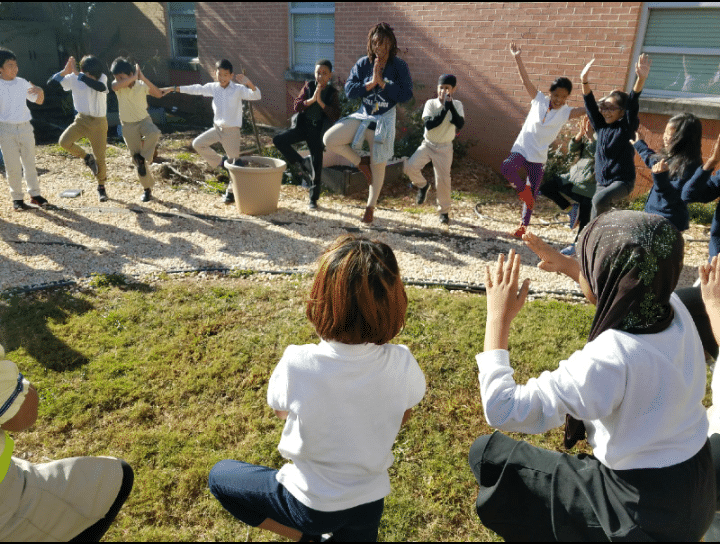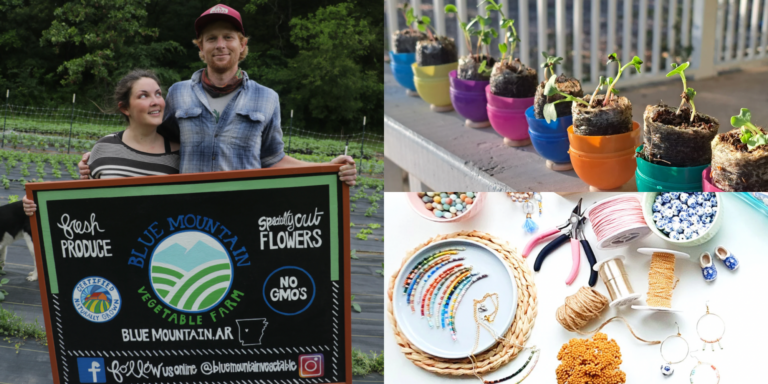How FoodCorps Members Support Kids’ Mental Health
From mindfulness in the garden to plant part yoga.
From mindfulness in the garden to plant part yoga.

Families send their kids to school every day to learn, grow, and build skills that prepare them for the future. This means learning the basics like reading, writing, math, and science—but it also means nurturing kids’ mental health. Just like their academic lessons, what kids learn about mental health at school can affect them for a lifetime.
Children’s mental health matters. The COVID-19 pandemic “exacerbated an already growing crisis in youth mental health,” with more children showing signs of anxiety and stress. And with kids spending the majority of their waking hours at school, mental health challenges are bound to affect not just how kids learn, but how they experience their classes, activities, and peers.
One approach to education that promotes positive mental health is called social and emotional learning (SEL). Embracing SEL can have a strong impact on kids’ mental health, affecting how they manage emotions, show empathy for others, and develop relationships.
There’s a connection to academics, too; research shows that kids who participate in social and emotional learning programs have significantly better school attendance records, show less disruptive classroom behavior, like school more, and perform better in school.
FoodCorps lessons are designed to encourage students’ social and emotional growth, which can support their mental health, too.
Hands-on education helps to meet students’ needs for play and social connection, and supports their emotional growth by helping them to develop a sense of self-awareness and make responsible decisions. And lessons in school gardens can help kids develop agency, build confidence, and grow as stewards of their environment.
We’re grateful for the creative ways our FoodCorps AmeriCorps service members incorporate mental health and wellness in their interactions with students. This Mental Health Awareness Month, check out how service members are prioritizing their students’ mental health in gardens, classrooms, and cafeterias.
Students can practice regulating their bodies and their emotions through mindfulness activities, like mindful breathing or tasting.
Kevion Young, a Mississippi service member, brings a crystal quartz sound bowl with him to class to encourage calmness and relaxation in his students:
“I use these in my classroom to help the kids with their social and emotional learning. We’re really big on making ourselves aware of where the students are emotionally in their journey, so that they can increase their awareness in their time and space and center themselves in their focus in the classroom. The sound washes over their environment [and] really allows the students to get in touch with their breath and their vibe.”
Watch Kevion demonstrate the sound bowl.
Bridgette Byrd, a service member in Newark, New Jersey, shares an example of how she encourages mindfulness while tasting new foods:
“What goes into the creations of my lessons, definitely there’s a mindfulness component. I want people to be aware of how they’re experiencing the food that they’re tasting, that they’re seeing, that they’re touching. There’s a whole sensory exploration that goes with food, and food is all about cultivating that experience. And then it cultivates memories.
“A lot of times what we do is we sit down, we quickly eat, and then we’re off and on to the next thing, but we need to sit with our food and experience it. So I’m big on conscious consumption, and what that basically is to me is being conscious and being aware of how you’re feeling in the moment with food and how food speaks to you.”
Learn more about Bridgette’s service.
You don’t have to sit still to learn! FoodCorps service members often integrate kid-friendly movement into lessons about food and nutrition, nurturing kids’ minds as well as their bodies.
In the early days of the pandemic, when many service members were teaching virtually, Kelsey Ioannou (FoodCorps OR ‘19, ‘20) taught a video lesson about the parts of a plant through yoga, encouraging deep breathing and gentle movement.
There’s something powerful about spending time in the garden—just ask our service members. FoodCorps Georgia alum Zashe Cockett-Demings reflected on how her students found healing and calm by tending the garden:
“Healing occurs through every aspect of gardening. There’s a natural meditation that happens when tilling the soil, weeding, watering, and planting… Every herb sniffed, every vegetable harvested, even putting your hands in the soil releases endorphins, the happy chemical in your brain that boosts your mood, allowing the perception of yourself and the world around you to shift.
“Since the beginning of the school year, I was given the opportunity to work with a group of students facing trauma, anxiety, depression, ADD, ADHD, and/or behavioral issues once a week. The main objective is to provide a support system for young people of color to grow and heal in the garden. This is usually done through garden-based activities which include garden maintenance, cooking demonstrations, yoga, and herbal medicine.
“At first, it was a bit of a struggle because most of the students were more concerned about not getting their clothes dirty than gardening. However, now they are leading garden tours, EATING the food in the garden, and hauling wheelbarrows full of compost in and around the school without even having to be told! It was a long journey to get to this point, but it is priceless to see so much growth.”
Read the rest of Zashe’s story about the garden as a safe space.
Mindfulness matters both in and out of school. During the virtual teaching days of the pandemic, FoodCorps Michigan alums Annalane Miller, Diego Alonso, and Erin Wenk put together a video series sharing mindfulness activities they use with students in the classroom and the garden. The techniques help students focus, manage their emotions, and enjoy the content of the lessons.
Watch Part 2 and Part 3 of the alums’ mindfulness series.
School is where kids figure out who they are—and sometimes, that means emotions they don’t know how to process. Arkansas Service Member Sophia Marion shared a story at a service member gathering about holding tough emotions for one of her students.
Sign up for FoodCorps emails to hear more stories of service.

Our 2024 Child Nutrition Policy Year in Review

9 Thoughtful Holiday Gifts Made by FoodCorps Alumni

The Policy Brief, Fall 2024: After the Election